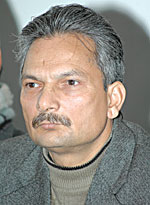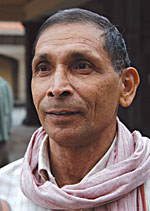 KIRAN PANDAY |
Janadesh: During your visit to the US, you mentioned that the party was thinking of changing its name to simply CPN. This has stirred a controversy.
Baburam Bhattarai: I don't understand why they are trying to make a storm in a teacup. The media exaggerated it as they were short of news during festival time. In fact, this issue had been a topic of discussion within the party for a long time. In 1949 there was only one communist party in Nepal, which divided in 1962 into different factions that consequently adopted suffixes to differentiate themselves from each other.
The followers of Marx were known as 'revolutionary' while Khrushchev followers were known as 'reformist'. The Russian reformists lost out after the collapse of the Soviet Union in the nineties, and only those who followed Maoism survived. Since the Maoist party has become the country's largest party, there is no need for it to have a tag anymore. We have discussed this within the party, but the media reported it as if the party was going to change its name?which is not true. The name of a communist party never changes.
The long-planned unification of the Maoists with CPN Unity Centre Mashal has not been finalised. It is said that a small faction in the party leadership, which doesn't want a merger, is still influential in the party.
We are in a drive for party unification, not only with Unity Centre but also with other small revolutionary forces. In all parties one can find extreme rightists and constricted leftists as well as moderates. We are revolutionary in leadership and at the cadre level too. We believe the revolutionary movement in general should form a greater mainstream movement, and we are committed to that.
The party's course is said to have deviated from revolutionary to reformist after the Chunbang meeting, and voices have been raised to demand a change in the party leadership.
This is not true.This is propaganda created by those elements seeking to weaken the party's revolutionary leadership. Our party launched the people's war, fought a bloody struggle, and then through the Chunbang meeting came the peace talks, the CA and the establishment of a democratic republic?a pro-public and independent republic. And moving ahead, this is the party's revolutionary line. No one in the party can challenge it.
Do you think the upcoming national convention will accept the Chunbang declaration or endorse a new one?
We want to move forward with Maoist ideals and Prachanda Path. A 21st-century communism in Nepal will be unique: once a revolutionary people's republic is achieved, we will move towards socialism and then to communism. This is the line our party is following and there is no question of deviating from it. The national convention in 2000 and meetings held in 2003 considered international circumstances and decided on the model of the 21st-century republic and political ideology that our party is following.
In the central committee meeting, Mohan Baidya tabled a different political document from that of chairman Prachanda regarding party policy. Which document do you think will get most support at the national convention?
We might have many issues to be discussed at the national convention. Different views have come up in the central committee meeting which are yet to be finalised. However, after the national convention in 2000, we came up with a new ideology under the leadership of comrade Prachanda. Different thoughts may come up within the party which can be discussed. The party will follow the Prachanda ideology, which I believe is revolutionary and the correct direction for the party. And the upcoming national meeting will also endorse the mainstream ideology.
Interview with Mohan Baidya in Naya Patrika, 21 October
You are known as the leader of your party's hardliners. What are your differences with the party line? 
I have a feeling that this is a conspiracy to create a rift between hardliners and moderates within the party. If you are ideological you are labelled a radical. Pragmatic thinking has posed a threat to the communist ideology. I have no personal differences, but it is not good to go to the media about internal disagreements. There are concerns that the party will deviate from fulfilling the dreams of the proletariat and fall prey to the extreme right. These are the party's concerns, not mine alone.
Is there a race between your party and the UML to change your names to just CPN?
It is natural for the UML to change its name. There are people in the UML who believe in communism but the party is no longer a communist party. It should not only drop UML but also change its name entirely. However, it is nor relevant for us to change our party's name.
But your party chairman himself said you have been discussing a name change for two years.
We discuss a lot of issues. But in a communist party it is final only after the party makes a decision. The 'Maoist' suffix is not like 'UML'. It is the party's identity, the symbol of a decade-long people's revolution and people's sacrifice. It makes no difference who is saying what in a personal capacity, it is the party that makes decisions. We can't rule out the possibility of a single communist party of Nepal in future, but I don't see it happening soon.
Are you a candidate for the acting chairmanship of your party?
I never offered my candidacy for a party position. The party statute has no provision for acting chairman. A proper division of tasks could be the solution to the present problem. Not all comrades are in the government or the CA. They should be given the responsibility of running the party. Our chairman is acting as chairman and prime minister out of compulsion. He is our supreme leader, and therefore a one- person, one-position policy is not possible. It should be applicable to everyone except the chairman.
Why do you oppose your chairman's proposal for a merger with the Unity Centre?
Party coordination committees have already been formed on both sides to work out a procedure. We are holding meetings and the issues will be finalised in a while. We will discuss this issue in our central committee and also put it to the national convention, which will decide on it. We are in favour of unification but it should not be done in hurry. There are still basic political and ideological differences between us to be resolved.
Does the people's republic line dominate the democratic republic line in the central committee?
There are three trends in our party. The opposing ideas within the party make the party dynamic. These are creative differences, and to publicise internal discussions is to invite anarchy.
Are you worried that the party is becoming reformist?
It is not only me who is worried about it. Thirteen thousand lives were sacrificed in the people's war. People's expectations rose and there was hope of political, cultural and economic transformation. We established a pro-people government in the course of the movement in the past that must deliver on those promises.


